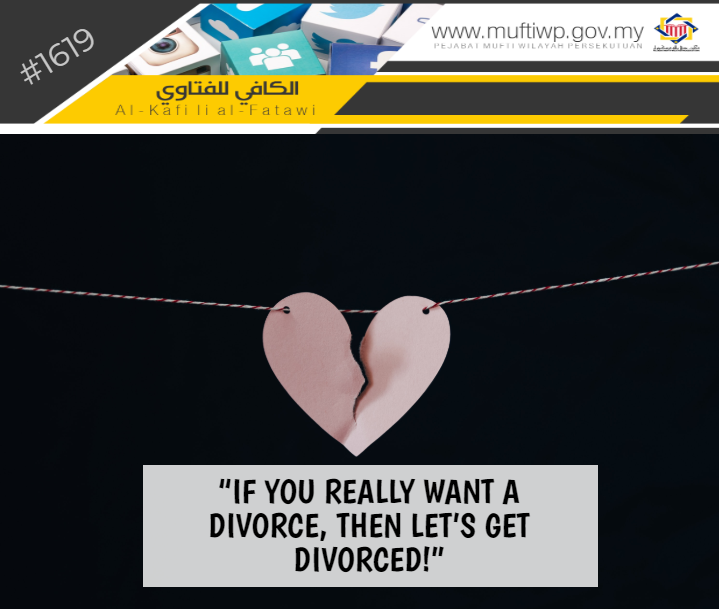Question:
Assalamualaikum w.b.t,
Ustaz, I would like to ask. Yesterday, I had an argument with my wife. During that time, my wife challenged me to divorce her. As I was unable to hold back my anger, I uttered words like the following:
“If you really want a divorce, then let’s get divorced!”
Are we considered as divorced now, ustaz? I did not have any intention of doing so at the time. My intention is even if we really do want to separate, we may go on with the procedure. Hope for an explanation. Thank you.
Answer:
Waalaikumussalam w.b.t,
Alhamdulillah, praise and thanks to Allah for the countless blessings He has blessed us all with. Blessings and salutations to the Prophet Muhammad PBUH, his wives, his family, companions and all those that follow his teachings to the day of judgement.
Words of divorce are divided into two; either explicit (sarih) or implicit (kinayah). It is stated in the book al-Fiqh al-Manhaji (2/116-118):
“Words used to indicate talaq explicitly and cannot be interpreted to have any other meaning is called explicit (صريح). While words that do not indicate talaq explicitly and can be interpreted to have another meaning is called metaphorical pronouncement (كناية).”
“Explicit pronouncement also includes the translation of the phrase ‘talaq’ itself to a language other than Arabic according to the common usage of a society like how ‘talaq’ is used by the Arabs.”
The example would be the use of words that used only in the meaning of talaq like (طلاق) itself, release (سراح) or separate (فراق), and the derivative words from these phrases like:
- “You are divorced”
- “You are let go”
- “I divorce you”
- “I separate from you”
- “I let you go”
While metaphorical pronouncement is as follows:
- “You have nothing to do with me anymore”
- “You are separated from me”
- “You are not related to me anymore”
- “Go back to your family”
- “Go wherever you want”
- “Go away from me”
- “Separate yourself from me”
- “I’m leaving you so go your own way”
- “You are haram for me”
Imam al-Shafi’e said in al-Umm (5/129)
“Those words are what Allah tabaraka wa taala defines as talaq, when He says:
إِذَا طَلَّقْتُمُ النِّسَاءَ
“…when you [Muslims] divorce women,”
Surah al-Talaq (1)
And His saying:
فَأَمْسِكُوهُنَّ بِمَعْرُوفٍ أَوْ فَارِقُوهُنَّ بِمَعْرُوفٍ
“…either retain them according to acceptable terms or part with them according to acceptable terms,”
Surah al-Talaq (2)
And the saying of Allah Azza wa jalla:
فَمَتِّعُوهُنَّ وَسَرِّحُوهُنَّ سَرَاحًا جَمِيلًا
“So, provide for them and give them a gracious release.”
Surah al-Ahzab (49)
So, those words are the base. While whatever words that are similar to the meaning but are not defined as talaq in the Quran, Sunnah, athar (which are unclear) are not said as one unless the husband intends to do so. Hence, if a husband intends on divorcing his wife while uttering words that resemble talaq, then talaq is sentenced. If he did not intend to do so, then talaq is not imposed.”
Hence, based on the above facts and explanation, we are inclined to the opinion that talaq is not imposed by simply saying “If you really want a divorce, let’s get a divorce!”. It is because there is a difference on the explicit pronouncement in Malay language even with the use of words ‘divorce’ like “I divorce you”. The effect of phrases like ‘if’ and ‘then let’s’ indicates uncertainty and not a hundred per cent the same as the phrase “I divorce you”. There is a possibility that the use of phrase ‘then let’s’ means “Let us go on with the process of divorce” which involves an application to the court and etc. Probably, ‘then let’s’ also refers to as the phrase ‘if you want to’ and not to stress out the phrase ‘divorce’ itself.
Still, it is better to refer this case to the nearest Syariah Subordinate (Lower) Court to clearly confirm the pronouncement of talaq from the authorities. Wallahua’lam.
May Allah SWT give the one who asks and his family strength and ability to face life in the future.


